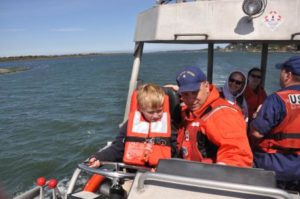Our friends at the U.S. Coast Guard want us all to be safe. See below for some basic tips, and remember to never take safety for granted! -KH

A Garibaldi Grade School ‘Leader of the Pack’ honor student receives an honorary boat ride with a Station Tillamook Bay, Ore., 47-foot motor lifeboat crew, Friday, May 25, 2012.
Five “Leader of the Pack” honor students from the school rode along on the motor lifeboat in conjunction with a safety fair held at Station Tillamook during National Safe Boating Week.
U.S. Coast Guard photo by Station Tillamook Bay.
SEATTLE ─ Today marks the first day of National Safe Boating Week and the Coast Guard would like to remind everyone to take every precaution while out on the water.
In 2013, across the United States, the Coast Guard counted 4,062 recreational boating accidents that involved 560 deaths, 2,620 injuries, and approximately $39 million dollars of damage to property as a result of recreational boating accidents.
Summer is approaching quickly, and the days are becoming both longer and warmer. As boaters across the Pacific Northwest prepare to take advantage of the improving weather, the Coast Guard reminds them to take initiative and care while on the water.
Whether you’re a seasoned boater shaking off that winter rust or a new boat owner looking to get out and make some waves, it is important to always make sure your boat is ready for the water. Contact the Coast Guard Auxiliary for a vessel inspection and they will help boaters ensure they have the mandated safety equipment aboard their boat. For more information on the Coast Guard Auxiliary, visit http://www.d13cgaux.com/sites/.
DO!!!
Always wear a lifejacket when out on a boat.
- In 2013, 77 percent of fatal boating accidents were the cause of drowning. Of those victims reported from drowning, 88 percent were not wearing a lifejacket.
- Of the children under the age of 13 who lost their lives in boating accidents, 36 percent died from drowning. Of those children who died, 62.5 percent were not wearing a lifejacket as required by state and federal law.
DON’T!!!
Never boat under the influence of drugs or alcohol. Have fun in the sun, but be responsible.
- Alcohol use is the leading known contributing factor in fatal boating accidents. While the primary causes of those accidents are unknown, it is listed as the leading factor in 16 percent of deaths.
- Alcohol can reduce body temperature and hinder a person’s response time. Both alcohol and drugs impair good judgment, which may cause people to take risks they would not otherwise take.
REMEMBER!!!
- Boaters should invest in a VHF-FM radio as their primary means of communication on the water. A VHF-FM radio is much more reliable than that of a mobile phone, especially in remote areas where mobile reception may be limited.
- Emergency Position Indicating Radio Beacons help to save lives. According to the National Oceanic and Atmospheric Administration, 7,310 people have been rescued in the United States because of an EPIRB since 1982.
- Always have a float plan. Tell someone where you’re going, how long you’ll be gone for and when you will be back. For more information on creating a float plan, visit www.floatplancentral.org.
- Operator inattention, improper lookout, operator inexperience, excessive speed, and machinery failure rank as the top five primary contributing factors in accidents.
For more information on boating smart and safely, visit http://www.uscgboating.org.